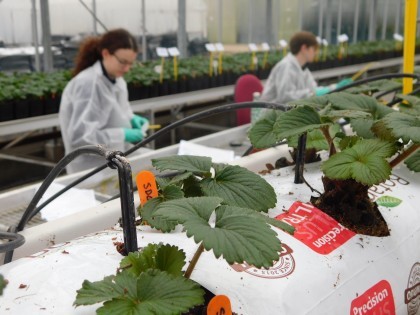
The deadline for applications is 22nd February 2022. Interview decisions are expected by April/May 2022.
The UKFS-CDT offers 15+ fully-funded studentships for cohort 2 in 2022.
NIAB EMR is a member of the UK Food Systems Centre for Doctoral Training (UKFS-CDT) programme. This will train over 65 doctoral students from 2021-2027. The UKFS-CDT will create cohorts of future food systems leaders and innovators who can lead the UK towards a resilient, healthy and inclusive food future. It is an innovative way of conducting your PhD centred on co-creation and exposure to a varied range of actors operating in the UK food systems.
The UKFS-CDT brings together the Natural Resources Institute of the University of Greenwich (lead), University College London, Royal Veterinary College, Institute of Biological, Environmental & Rural Sciences at Aberystwyth University, Centre for Food Policy at City University, University of Sussex, and Brunel University London; and two leading agricultural research institutes, NIAB EMR and Rothamsted Research, plus over 50 partners from business, government and civil society. Brunel University London has substantial research expertise covering all areas of Food Systems Research.
Research will be fundamentally interdisciplinary and combine natural sciences (STEM) and social sciences (SHAPE) approaches, and methods. All students will work with food systems stakeholders in their studies. Research can encompass (but is not limited to) the following topics:
- Food environment, consumer behaviour, diets, nutrition and health (Healthy People)
- Livestock health and welfare (Healthy Animals)
- Environmental sustainability, climate change (Healthy Environment)
- Food production, distribution, manufacturing and waste (Healthy Economy)
- Food system governance and resilience (Healthy Society)
NIAB EMR’s mission is to support the UK horticulture sector to transform into a climate-resilient production system and reach net-zero carbon through suitable adaption and mitigation measures. Some of the areas that NIAB EMR’s supervisors can offer expertise in are:
- optimising water, fertiliser and land use efficiency
- maximising the nutritional value of fruit and vegetables
- understanding crop and environmental interactions
- understanding and enhancing the ecology and biodiversity of the food production systems to reduce the impact of pests and pathogens
- sustainable management of pest and diseases in production, during the storage and trade
- investigating and deploying durable disease resistance
- understanding and harnessing microbial diversity of both pathogenic and beneficial microbes
- quantitative genetics and bioinformatics
The UKFS-CDT programme is a bespoke interdisciplinary food systems programme with a novel approach to doctoral training. In the first year, each UKFS-CDT student undertakes two 4-month rotation projects at two different institutions in the UKFS-CDT consortium. Rotation projects are clearly defined studies designed to provide our students with the research skills, training and subject knowledge required to prepare a full interdisciplinary PhD proposal at the end of year 1. The PhD project will commence in year 2 (find out more here). There will also be a three-month placement with industry, government or civil society in the second or third year of the PhD programme.
CDT scholarships include tuition fees and a tax-free UKRI stipend for 4 years. UK and International applicants are eligible for UKRI-funded postgraduate studentships. CDT PhD projects must address UK food systems.
The CDT values equality, diversity, inclusion and we welcome applications from anyone regardless of age, disability, race/ethnicity, religion, sex, gender identity or sexual orientation.
We actively promote and encourage an inclusive environment. We aim to provide high standards of support to all participants in order to ensure that each doctoral student has the skills and opportunities to excel in the programme.
For more information visit the UKFS-CDT website or contact Eleftheria Stavridou and Matevz Papp-Rupar
